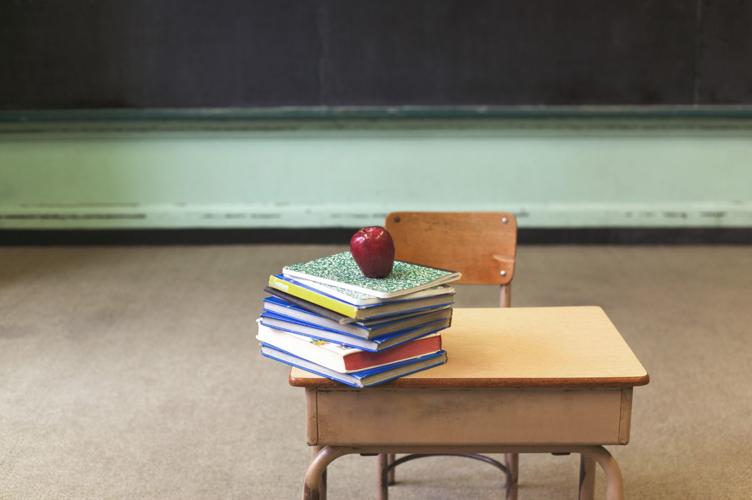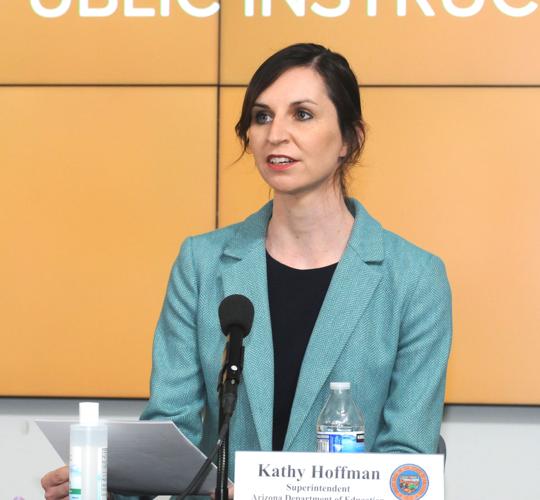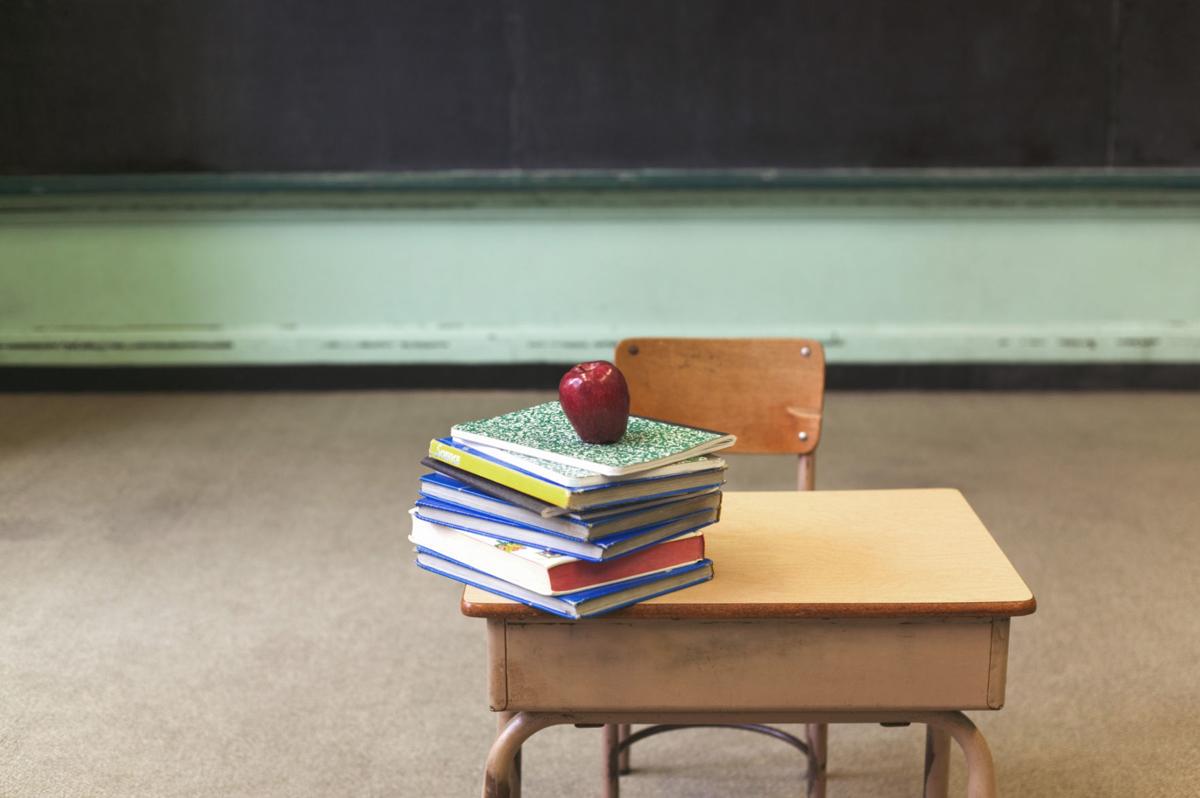A sharp drop in the number of youngsters in Arizona kindergartens this year due to COVID-19 could have ripple effects on their education for years to come.
While enrollment in public schools is down 5% from the same time a year earlier, the preliminary figure is about 14% for kindergarten, said state Superintendent of Public Instruction Kathy Hoffman.
She said parents are telling her that their concerns about the coronavirus are causing them to keep their children at home. That’s allowed; kindergarten is optional.
This video offers some pros and cons of online education, as many schools and universities have suspended in-person classes due to the spread of the coronavirus.
But Hoffman, who as a speech therapist worked with young children, said there are major implications to skipping this stage of organized instruction. Those who do not attend could end up with issues, not only when they go into the first grade a year from now but even further down the road, she said.
“One of the greatest benefits is the social and emotional learning and being able to play with other kids,” Hoffman said. But she said parents also are worried about the spread of the virus in classrooms.
The schools chief said she remains convinced the best bet is to get those kids into kindergarten for at least a few hours a day.
“Some of the most important skills that they’re learning are the letter sounds, the name for the letters and the alphabet,” she said. Kids also start reading simple words.
“They’re learning to count objects, and they’re learning what numbers look like and how to name numbers,” Hoffman continued. “So those are very important foundational skills as they go through the grades.”
The failure to pick up on those — and early — could come back to haunt those kids later on, Hoffman said.
Central to that is Move On When Reading. That law says students cannot be promoted from the third grade if they score “far below” that grade reading level on the statewide assessment.
Hoffman’s not a big fan.
“Our kids come from so many different backgrounds,” the Democratic elected official said. “The kids that are struggling readers are typically coming from disadvantaged homes.”
More kids starting regular school without the benefits of kindergarten teachings, Hoffman said, could lead in a few years to more children being told they’re not going on to the fourth grade.
“And it is a huge social and emotional impact on students to be held back a grade,” she said.
But it remains the law.
Then there are the less measurable but also equally important social skills.
“They’re also learning how to be a student,” Hoffman said.
“They’re learning to get in line, they’re learning to take turns, to share, to problem-solve,” she explained. Even learning how to have social interactions with other kids is “very critical.”
“I think all the impact of what we’re seeing right now is yet to be seen,” she said.
Hoffman isn’t the only one worried about children missing out on what they learn in kindergarten.
Christine Thompson, president and CEO of Expect More Arizona, an education advocacy group, said if youngsters don’t learn the basics in kindergarten, especially of letter recognition and reading, it’s going to “take a lift” to ensure they are not held back in third grade.
For parents who do not want to send their kindergarten students into classrooms, there are online options. But Thompson doesn’t see that as a realistic option for picking up reading skills.
“When you think about how technologically savvy you have to be in order to navigate the web, it’s really falling on parents to help them,” she said.
Thompson said she is sure there are programs that can help young children learn their letters and sounds.
“But you really need those educators with kids, helping to identify what the challenges are, or what things are going to get a kid hooked on reading, or really understanding the contents that are so incredibly important, especially in those really early years,” she said.
And there’s a more practical concern.
“Being online can be really exhausting, especially in these really little kids,” Thompson said. Pediatricians have stressed the importance of young children having only limited screen time.
“To go from that to having school online is a massive shift,” Thompson said. “So we’re going to have a lot of ground to make up.”
Hoffman said her message to parents planning to keep their kindergartners at home would be to reconsider.
“As far as we can tell from the research that’s been done this year, the spread of COVID-19 is extremely low for the K through eighth grades,” she said.
“Missing out on a whole year of school can have detrimental effects in the long term,” Hoffman continued. “And school provides such amazing opportunities and wrap-around support for our kids, not just academically but also socially.”
Photos: Back-to-school in Tucson during the pandemic
"Mustang Stampede"
Updated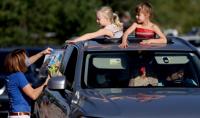
Maddy Jacobs, 7, middle, reaches for her remote learning tool kit from her teacher, Kris Green, as her friend, Carly Kupinski, 6, watches during a "Mustang Stampede" at Manzanita Elementary School for the first day of school on August 17, 2020.
First Day of School, John B. Wright Elementary
Updated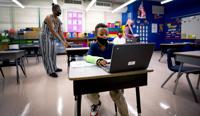
Augusta Iranzi, center, attends his teachers online class while monitors Jasmine Phillip, left, and Nadifo Yusuf, watch students inside a classroom at John B. Wright Elementary School, 4311 E. Linden St., in Tucson, Ariz. on August 17, 2020. About 10 students came to school for online instruction under the guidance of classroom monitors.
"Mustang Stampede"
Updated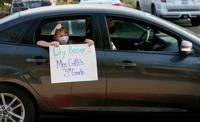
Lily Baser, 8, identifies herself for easy remote learning tool kit pickup during a "Mustang Stampede" at Manzanita Elementary School for the first day of school on August 17, 2020.
"Mustang Stampede"
Updated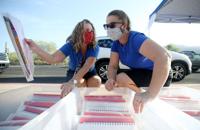
Krista Westmoreland, left, a third grade teacher, shows the remote learning tool kit of a student to Anna Ames, music teacher, during the "Mustang Stampede" at Manzanita Elementary School for the first day of school on August 17, 2020.
"Mustang Stampede"
Updated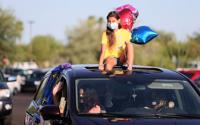
Maya Brown, 9, rides in style for her remote learning tool kit pickup during a "Mustang Stampede" at Manzanita Elementary School for the first day of school on August 17, 2020.
"Mustang Stampede"
Updated
Multiage teachers Kris Green left, and April Pollow greet and cheer on their students during a "Mustang Stampede" at Manzanita Elementary School for the first day of school on August 17, 2020.
"Mustang Stampede"
Updated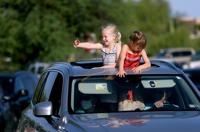
Maddy Jacobs, 7, left, waves to her teacher as she stands in the sunroof with her friend, Carly Kupinski, 6, during a "Mustang Stampede" to pickup their remote learning tool kit at Manzanita Elementary School for the first day of school on August 17, 2020.
"Mustang Stampede"
Updated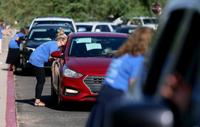
For the first day of school teachers at Manzanita Elementary School greeted their students during a "Mustang Stampede" and handed out remote learning tool kits on August 17, 2020.
"Mustang Stampede"
Updated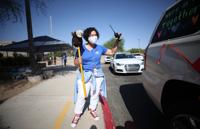
Kim Boling, principal at Manzanita Elementary School, greets her students and parents with a mustang during the "Mustang Stampede" for the first day of school on August 17, 2020.
First Day of School, John B. Wright Elementary
Updated
Yarani Martinez gives a monitor a thumbs up to inform the monitor that his online class is working after classes began at John B. Wright Elementary School, 4311 E. Linden St., in Tucson, Ariz. on August 17, 2020. About 10 students came to school for online instruction under the guidance of classroom monitors.
First Day of School, John B. Wright Elementary
Updated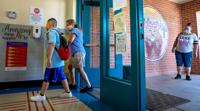
Alice Flores, right, watches as her grandson Jesus Silva is escorted to the cafeteria before classes began at John B. Wright Elementary School, 4311 E. Linden St., in Tucson, Ariz. on August 17, 2020. About 10 students came to school for online instruction under the guidance of classroom monitors.
First Day of School, John B. Wright Elementary
Updated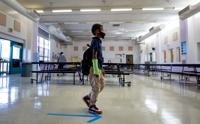
Augusta Iranzi follows the directions on the floor while being escorted to a classroom at John B. Wright Elementary School, 4311 E. Linden St., in Tucson, Ariz. on August 17, 2020. About 10 students came to school for online instruction under the guidance of classroom monitors.


